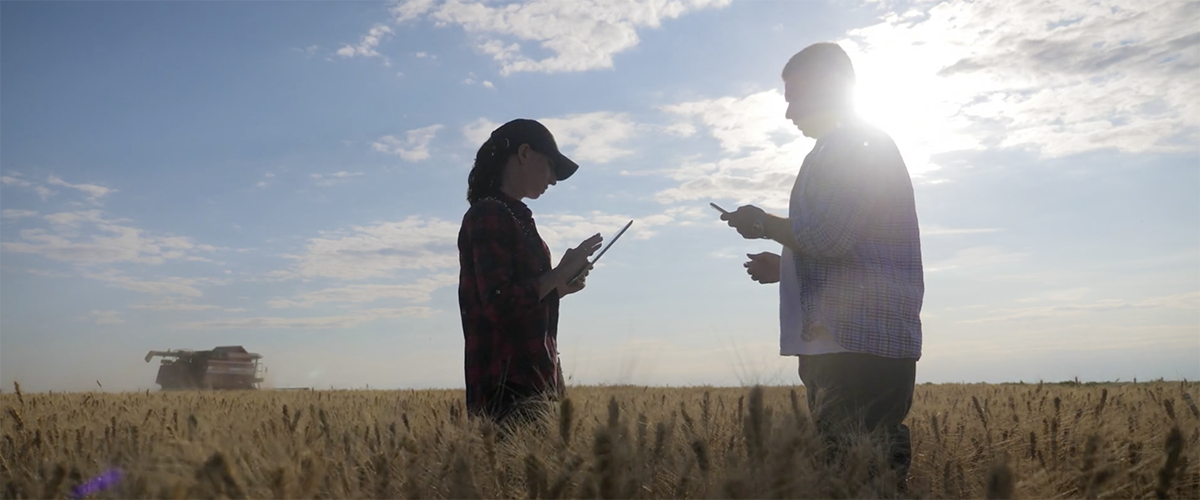
Unlocking the agricultural data revolution

University of Minnesota convenes world-class leaders from multiple sectors to explore opportunities in the management and use of agricultural data to benefit farmers and beyond
In one word, what do farmers, scientific researchers, private sector companies, NGOs, government agencies and others need in common to succeed in their respective agricultural endeavors? Data.
Why is agricultural data important? Agriculture forms the backbone of human survival and well-being. It also is one of the largest drivers of natural resource use and impact on the planet. As we’ve seen during the COVID-19 pandemic, the resiliency of our agricultural and food systems is more important than ever. Data is a key driver in serving everyone — from farmers to consumers — and creating a healthy, sustainable world. But, building for the future requires innovation and collaboration in how we digitize and use data for the benefit of all.
During ‘Unlocking the Agricultural Data Revolution,’ a two-day virtual event convened in fall 2020 by the University of Minnesota*, sponsored by FFAR and UMII and hosted by GEMS and IRSA with significant coordination by OpenRivers, experts across industries and sectors came together to discuss critical topics in data ownership, applications, outcomes and usage. More than 440 people, including 73 students, registered to attend. They delved into myriad topics, such as ‘collaborating and creating with farmers,’ ‘improving sustainable ag production with data,’ data privacy and cybersecurity’ — and much more.
Over the centuries, advances in agriculture have moved from mechanical (using machines to do the work), to chemical (such as applying pesticides and herbicides), to biological (the Green Revolution) to the current major breakthrough — digital.
“Digital is the next step in the natural evolution of agriculture,” said Kevin Silverstein of the GEMS Agro Informatics Initiative and Minnesota Supercomputing Institute, explaining that gathering data is in fact the easy part. The hard part is bringing it together so it can be analyzed, shared and used.
“Ag data has a variety of different forms, formats, implications and meanings,” said Silverstein. “The participants at our event share a common vision of wanting to raise the level of digital agriculture to achieve its promise and dream — which is to have an interconnected system where we can advance the field.”
Data on the farm
Agricultural data is gathered on farms big and small across North America to monitor soil health, water quality, growth rates and much more. And while there’s no shortage of information collected, there is great need to make the data actually usable.
“Farmers are overwhelmed by so much data,” said Ali Joglekar of the GEMS Agro Informatics Initiative. “They might be asked to share their data with dozens of different systems, none of which interoperate with each other, making it very difficult for them to use their data to make informed decisions. If we can create ways to move data more easily between systems, farmers — as well as policy makers, government agencies, companies and others — can use the data to improve productivity, the environment, nutrition and food security, working across the food system from farm to fork.”
GEMS does exactly that, using the GEMS platform to shepherd and facilitate the sharing of data across public and private spaces, focusing on the interoperability of data in the agricultural domain. GEMS is a leader in getting disparate pieces of ag data, both big and small, to talk to each other in ways that farmers, companies, governments, NGOs and others can use, with rigorous protocols to maintain data privacy and integrity.
This will help farmers get what they really want from data to make it useful. As Aaron Ault, a farmer and senior research engineer at the OATS Center at Purdue University said in a pre-event webinar, “Data in agriculture is a pain in the neck. Because it’s a pain for everybody, there’s got to be some way to make this better.” Ault explained that data should flow from whatever source a farmer has into whatever tool the farmer wants, without manual intervention, adding that ag researchers and statisticians want the same.
Keys to success — interoperability, privacy, trust
At the ‘Unlocking the Agricultural Data Revolution Event,’ the words interoperability, privacy and trust were heard in many conversations. “Information is being generated and housed in virtual silos all over the world, so we spent a lot of time discussing ways to bring the silos together and make them work in tandem,” said Silverstein, adding that participants dug into that topic in a breakout session, titled 'Imagine What’s Possible by Sharing Interoperable Data,' led by Phil Pardey, Director of the GEMS Informatics Center and Co-Director of the GEMS Informatics Initiative.
Privacy was top of mind, as well. “Just like consumers, farmers are concerned about data privacy,” said Joglekar. “In GEMS, we abide by FAIRER data standards to ensure the data is findable, accessible, interoperable, reusable, ethical and reproducible. But with that said, maintaining the security of data for its individual owners is paramount.” GEMS and its collaborators are developing ways to enable public researchers to tap private data in their research projects while preserving private intellectual property, she added. “We want and need automation and access, but we absolutely cannot sacrifice privacy.”
Perhaps the most vital component underscoring all this work is fostering trust. Forging trusted relationships with farmers is critical, because ultimately the data starts with the producers who created it. Billy Tiller, a Texas farmer and CEO of Grower Information Services Cooperative, said it well as he discussed how ag tech can meet farmers’ needs in a pre-event webinar: “Progress moves at the speed of trust.”
With GEMS and its many collaborators dedicated to continuously discovering, learning and sharing to make the world better for farmers and everyone, we can trust there’ll be impactful results.
*Event coordinators also included CTIC, OpenTEAM, Purdue University and OATS.





